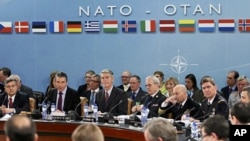At a rare joint meeting in Brussels on Wednesday, foreign and defense ministers of the North Atlantic Treaty Organization, or NATO, reportedly moved toward an agreement on the alliance's future role in Afghanistan, and discussed improving their joint military ability to deal with 21st century challenges. It was the final high-level preparatory meeting before the NATO summit in Chicago next month.
NATO Secretary-General Anders Fogh Rasmussen says the ministers moved toward defining a new mission in Afghanistan, as Afghan forces continue to take more responsibility for their country's security.
"It will be a new mission and a new role for NATO," said Rasmussen. "And together with the rest of the international community, we will play our part and pay our share in sustaining Afghan security forces at the right level in the years to come."
Despite recent Taliban attacks, Rasmussen and other officials say the NATO withdrawal and transition plan is on schedule. Afghan forces are to have responsibility for their entire country around the middle of next year, and foreign forces will largely pull out by the end of 2014. After that, NATO's role is to involve training, non-combat support and funding. The secretary-general says several countries announced in Wednesday's closed-door meetings that they will contribute to the estimated $4 billion per year needed to fund the Afghan security forces.
U.S. Secretary of State Hillary Clinton praised the performance of Afghan forces in responding to the recent Taliban attacks. And she said that as NATO has worked to influence Afghanistan's future during more than 10 years of conflict, the war has also transformed NATO.
"NATO has also been changed by this experience," said Clinton. "The alliance is now a leading force for security, not just in the Atlantic region, but globally."
But experts say that global role is under threat from a continuing lack of coordination of capabilities in the alliance and budget cuts driven by economic hard times in Europe and the United States.
Political scientist Sean Kay of Ohio Wesleyan University in the United States says recent operations in Afghanistan and Libya reveal major shortcomings in capabilities that must be addressed at the Chicago summit.
"The temptation is always to say, 'This is the greatest, most successful alliance in the history of the world.' And that's true. But it also has serious, serious fundamental problems - operating problems, political commitment problems - that come out of the Afghanistan war [and] were exacerbated in Libya. If NATO just comes to Chicago, pats itself on the back and says, 'We're on plan and we're just doing great,' they haven't made the kind of deep-seated changes that need to be made," said Kay.
Secretary-General Rasmussen says the NATO summit will adopt new initiatives designed to improve interoperability among alliance military forces.
U.S. Defense Secretary Leon Panetta says the allies are already moving in that direction.
"Across the board, allies are making important commitments to smart defense with opportunities for new capabilities in ISR [Intelligence, Surveillance and Reconnaissance], missile defense and air-to-air refueling. While significant progress has been made, important work lies ahead," said Panetta.
An internal NATO report cited specific problems in the Libya operation last year, particularly related to a shortage of high technology weapons and surveillance capabilities that only the U.S. military can provide. Secretary-General Rasmussen is calling on the allies to adopt an unprecedented level of cooperation, including coordination before individual national decisions are made on defense budget cuts.
News
NATO Ministers Plan Future Role in Afghanistan
- By Al Pessin










